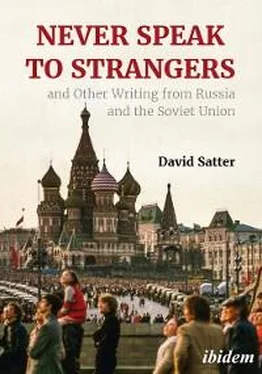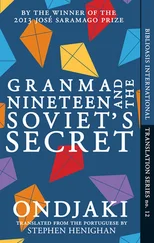I arrived in Vilnius by train on February 15, 1977 shortly after dawn and met Jokubynas at my hotel. We took a bus to Kestutis’s apartment. Kestutis lived in a single room in a housing block in a new area of the city. A solitary window let in the gray light of an overcast day and the walls were bare except for a rectangle of barbed wire over the fold out bed, a reminder of 17 years that Kestutis had spent in the camps. Kestutis poured me a cup of tea. He said he had little hope that he would live to see an independent Lithuania. He then mentioned, almost as an afterthought, that the next day, February 16, was the anniversary of Lithuanian independence.
At 5 pm, it became dark. We traveled by bus to the Old City, the heart of historic Vilnius, a section of weathered stone buildings, winding narrow streets, and gloomy inner courtyards in the shadow of ornate Catholic churches. From there, we took a bus to see Antanas Terleckas, another nationalist, who lived outside of Vilnius, on the edge of the Nemencine Forest. When we arrived, Terleckas welcomed us and we entered a small room crowded with people of all ages who were sitting on worn couches and chairs. The conversation was about what would happen the next day with nearly everyone predicting a show of force on the streets as in past years on February 16.
Several of the teenagers said that they would try to put flowers on the grave of Jonas Basanavicius, the father of the Lithuanian national movement who, by an odd coincidence, died on February 16. The point of laying flowers on his grave was to mark the national anniversary. But if stopped by the police, they could pretend that it was a personal gesture on the anniversary of Basanavicius’s death. This would convince no one, of course, but the police could be counted on not to arrest them at the graveside because that would acknowledge their fear of nationalism which officially did not exist.
The dissidents described the Lithuanian national activity in recent months—underground journals, the raising of the old Lithuanian flag over the ministry of internal affairs, arrests. I filled up most of a notebook and agreed to meet with Jokubynas in front of my hotel at 7 pm the following night.
The next morning was cold and overcast. I went with my guide for an interview with a government official and in the afternoon, for a trip to a collective farm. On the way, our car stopped to pick up a man who said he was an agronomist.
We left the collective farm in the late afternoon and the agronomist proposed that we take tea at a nearby club. I was anxious to return to Vilnius but agreed and we drove for 20 minutes before arriving at an isolated house. Although we had supposedly come for tea, the table was set for an elaborate meal. The agronomist said the club contained a Finnish sauna. He referred to the sauna several more times and then, elbowing me gently, asked, “How would you like to try it out?”
An hour passed in increasingly stilted conversation. Finally, ignoring the agronomist and addressing the guide, I said I wanted to leave. This brought an angry response from the agronomist who said the time had come to try out the Finnish bath. The agronomist, the guide and the manager of the club began chanting, “Finnish bath, Finnish bath.” I finally got up, took my coat and walked out to the car. It was only after I stood outside for 15 minutes that my guide and the agronomist joined me and we rode back into town.
I arrived in Vilnius at 7:30 pm but there was no sign of Jokubynas. I called Valery Smolkin, one of his friends. He said Kestutis had probably been arrested and suggested I come to his apartment to wait. I caught a cab and we turned down one of the side streets where I saw the scene that had been predicted by the nationalists the previous night. At each corner, uniformed police surrounded by milling crowds of obvious plainclothesmen were stopping passersby and checking their documents. The cabdriver, a Russian, said a policeman had been shot in a robbery of the state insurance company.
I arrived at Smolkin’s apartment at 8:40 pm. Three hours later, there was a knock at the door and Smolkin opened it to Kestutis who took off his coat, which was wet with newly fallen snow. He said that he had been on his way to meet me in front of the hotel when he was surrounded by five plain clothesmen. He was taken to a police station, the same one where he was taken after his first arrest in 1947, and put in a cell. He was then interrogated by a police officer who appeared drunk and spoke in a weird combination of Russian and Lithuanian and told him he was a suspect in the robbery of the state insurance company.” “I’ve been in the camps,” Kestutis said, “I’m not going to participate in your comedy.”
In the end, we spoke for several more hours and Kestutis gave me the address of Ints Tsalitis, a Latvian nationalist in Riga and the names and addresses of dissidents in Estonia. He also made one request. He asked me to make sure my notes from Lithuania never left my hands. I agreed and at that moment, I certainly intended to keep my promise.
The next morning I flew to Riga. The train from Vilnius to Riga was closed to foreigners. After I checked into my hotel, I realized that I had filled a notebook in Vilnius and would need a new one to interview city officials. I had promised the Lithuanians that I would keep my notes with me but the notebook was an awkward size. I finally forced it into my jacket pocket and left for the interview. That afternoon, however, I put the notebook in my suitcase and locked the suitcase in my room, leaving the key with the room clerk downstairs.
When I returned to the hotel, it was already dark. I asked the girl at the reception desk for the key to my room. But she looked and said she could not find it. I went upstairs and asked the floor attendant but she did not have the key either. I was now seriously worried. I went out for a walk. When I returned, I asked the girl at the desk to check again for my key. “Here it is,” she said, reaching into a slot in the key rack, “it was here all along.”
I took the key and went upstairs to my room. The light of the street lamps cast a pale glow in the darkness through the room’s nylon curtains. I opened my suitcase and saw that the notebook from Vilnius was still there. Everything appeared untouched.
I put the notebook back into my jacket pocket and caught a cab for Vecmilgravis, outside of Riga, to meet Tsalitis. I arrived at his home at 9 pm. He welcomed me and, as we sat in his kitchen, I told him about the events in Vilnius and warned him that I was probably being followed. He put on his coat and went outside with his dog, a large St. Bernard. When he came back, he said there was a black car parked at the end of the street with four men in it. “They’ve probably been there for several hours,” he said. “They don’t have to follow you. They know there are only a few places for you to go. It saves them time and energy.”
Tsalitis said that, in general, the situation was quieter in Latvia. There were no active dissident groups or samizdat journals. “The Latvians find it easier to get along with others,” he said. “It’s a virtue but it’s also our tragedy.” A half an hour later, Viktors Kalnins, another nationalist, joined us and he and Tsalitis gave me the names and addresses of Estonian nationalists in Tallinn. I wrote them on a separate piece of paper but they were the same names Kestutis had given me in Lithuania.
The next day in Riga I visited another collective farm. That evening I checked out of the hotel and prepared to go for a walk. Once again, I had to decide what to do with my notes. I had put the notebook in my suitcase. But I did not want to take a walk carrying a suitcase. I decided to leave it with the doorman. When I returned, I opened the suitcase. It appeared that nothing had been touched.
Читать дальше












